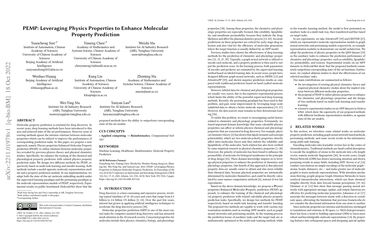PEMP: Leveraging Physics Properties to Enhance Molecular Property Prediction
Molecular property prediction is essential for drug discovery. In recent years, deep learning methods have been introduced to this area and achieved state-of-the-art performances. However, most of existing methods ignore the intrinsic relations between molecular properties which can be utilized to improve the performances of corresponding prediction tasks. In this paper, we propose a new approach, namely Physics properties Enhanced Molecular Property prediction (PEMP), to utilize relations between molecular properties revealed by previous physics theory and physical chemistry studies. Specifically, we enhance the training of the chemical and physiological property predictors with related physics property prediction tasks. We design two different methods for PEMP, respectively based on multi-task learning and transfer learning. Both methods include a model-agnostic molecule representation module and a property prediction module. In our implementation, we adopt both the state-of-the-art molecule embedding models under the supervised learning paradigm and the pretraining paradigm as the molecule representation module of PEMP, respectively. Experimental results on public benchmark MoleculeNet show that the proposed methods have the ability to outperform corresponding state-of-the-art models.
PDF Abstract




 MoleculeNet
MoleculeNet